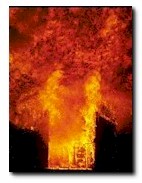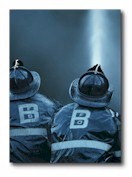|

|
|
 Fire: Nothing is more
terrifying. The thought of flames racing through your
home is probably your worst nightmare. Unfortunately, it is an all-too-frequent
occurrence in this country. Every year, 4,000 Americans die in fires.
The vast majority of those deaths occur at home—each year, 100,000
homes are destroyed, 40,000 family pets are killed and uncounted irreplaceable
family treasures are lost forever. Fire: Nothing is more
terrifying. The thought of flames racing through your
home is probably your worst nightmare. Unfortunately, it is an all-too-frequent
occurrence in this country. Every year, 4,000 Americans die in fires.
The vast majority of those deaths occur at home—each year, 100,000
homes are destroyed, 40,000 family pets are killed and uncounted irreplaceable
family treasures are lost forever.
Tragically, most fires are preventable.
The leading cause of fires in the home is faulty heating equipment.
A couple of simple measures can ensure that your home heating system
is safe. For example,
- Changing your air filter regularly will ensure that
your furnace isn't overtaxed.
- Don't leave piles of newspaper or other combustibles
within two feet of your furnace.
While home heating systems are the No. 1
cause of fires in the home, cigarettes are
the No. 1 factor in home fire fatalities.
- If you do smoke, be sensible.
- Don't smoke in bed.
- Use a large metal or glass ashtray.
- Put that cigarette out with water before you drop
it in the trash.
The No. 2 cause of fire-related deaths is arson.
Intentionally set fires claim the lives of more people each year than
all natural disasters—including floods, hurricanes, tornadoes and
earthquakes—combined.
- Most arson fires are fueled with combustible
material found nearby.
- A little diligence around the house, along with a
watchful eye for strangers, can make a world of difference.
In fact, a little diligence is the key to home safety
in general. It may go without saying, but:
 Smoke
detectors that work, Smoke
detectors that work,- fire extinguishers that are well-charged and quickly
accessible,
- and a ladder for the upper floors can easily save
lives.
How To Handle A Kitchen Fire:
Many household fires start in the kitchen. Untended
cooking and human error account for most of these. Not mechanical
failure of stoves or ovens. Here's how to handle a kitchen fire...
- Call 911 immediately. Prepare for the
worst and don't hesitate to call.
- Smother frying-pan fires by covering with a lid,
then turn off heat with lid in place until the pan cools. Do
not try to carry the pan outside because this could seriously burn
you should the contents spill out.
- Other food fires may be extinguished with baking
soda, so try to keep an extra box stored in an upper cabinet location.
Never use water or flour on cooking fires.
- Turn off the heat to smother oven or broiler fires
and keep the door shut.
- Well prepared homeowners keep a fire extinguisher
in the kitchen and know how to use it. The National Fire Protection
Association recommends extinguishers classified 2A:10B:C.
Make sure the one your choose is always UL (Underwriters Laboratories)
approved.

Learn More...
Overview
| Understanding The
Basics | Types Of
Insurance | Coverage
Amounts
Choosing A
Policy | Filing
A Claim | Other
Types Of Insurance | Home
Safety Tips
Planning
Concerns | Home
Glossary

Please Note: The
information contained in this Web site is provided solely as a source of
general information and resource. It is a not a statement of
contract and coverage may not apply in all areas or circumstances. For a complete
description of coverages, always read the insurance policy, including
all endorsements.
|

 Fire: Nothing is more
terrifying. The thought of flames racing through your
home is probably your worst nightmare. Unfortunately, it is an all-too-frequent
occurrence in this country. Every year, 4,000 Americans die in fires.
The vast majority of those deaths occur at home—each year, 100,000
homes are destroyed, 40,000 family pets are killed and uncounted irreplaceable
family treasures are lost forever.
Fire: Nothing is more
terrifying. The thought of flames racing through your
home is probably your worst nightmare. Unfortunately, it is an all-too-frequent
occurrence in this country. Every year, 4,000 Americans die in fires.
The vast majority of those deaths occur at home—each year, 100,000
homes are destroyed, 40,000 family pets are killed and uncounted irreplaceable
family treasures are lost forever. Smoke
detectors that work,
Smoke
detectors that work,